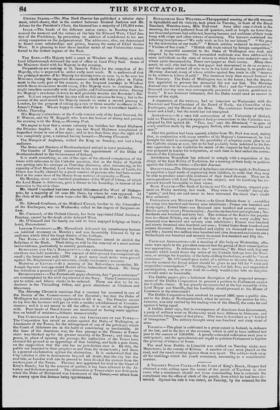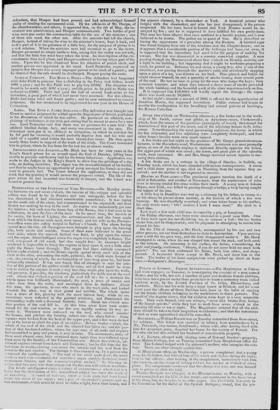A NAUGHTY PARISH Carnx.—In the Court of King's Bench, Hooper
had obtained a rule, calling upon the curate of the parish of Topsham to show cause why a mandamus should not issue commanding him to reinstate the complainer into the office of clerk of the parish, from which he had been dismissed. Against the rule it was stated, on Tuesday, by the counsel for the
defendant, that Hooper had been proved, and had acknowledged .himself guilty of stealing the sacramental wine. By the affidavits of Mr. Thorpe, of the churchwardens, and others, it appeared that, on the 4th of May, the sacrament was administered, and Hooper communicated. Two bottles of port wine were put under the communion-table for the use of the minister ; one of them was used, the other not. After the minister had left the church, Hooper, instead of taking the wine to the minister's house, kept it back, and took a part of it in the presence of a little boy, for the purpose of giving it to a sick relation. When the minister next had occasion to go to the vestry, Hooper presented an empty bottle to him, saying that the vestry was not safe, and that the little boy must have taken the wine. An investigation of the circumstances then took place, and Hooper confessed to having taken part of the wine. Upon this he was dismissed from his situation of parish clerk, and another person was appointed in his stead. Lord Tenterden expressed an opinion that Hooper was a very improper person to be clerk of a parish ; and he directed that the rule should be discharged, Hooper paying the costs.
ILLEGAL COMPACT. Tax KING v. BINKS.—The defendant had bargained with John Field to procure hint a clerkship in the Privy Seal Office, worth 500/. a year ; and for this Field was to pay hint 28001. The situation was found to be worth only 400/. a year • and the price to be paid to Binks was reduced to 25004 Field had paid the half of several bank-notes to the defendant, a great part of which had never been returned. For this offence, Binks had been tried and found guilty; and he now surrendered to receive judgment. He was sentenced to be imprisoned for one year in the House of Correction.
LIBEL. THE KING v. JAMES ACKLAND.--The defendant was brought into Court to receive judgment for a libel upon the Magistrates of Bristol, published in the Bristolian, of which he was editor. He produced an affidavit, coinplainin„; of unfairness in the trial, and stating that he meant to move for a new one. Lord Tenterden said that there was no pretence for a new trial: the affidavit libelled Judge, Jury, and every one concerned in the case. The defendant next put in an affidavit in mitigation, in which he said that the Is. Gtl. paid for swearing it would probably deprive him and his wife and child of a needful meal within the next twenty-four hours. He then spoke nearly three hours in support of the truth of the libels. The Court remanded him to prison, where he has been for the last ten or eleven weeks.
IMPRISONMENT FOR Assaehy.—Mr. Bligh has been for nine years in the King's Bench prison for an assault upon the Earl of Darnley, haNing been unable to procure satisfactory bail for his future behaviour. Application was made to the Judges in the King's Bench to allow him the privilege of a day rule, on finding securities. The object was the re-establishment of his health, and that he might have an opportunity of going amongst his friends to endeavour to procure bail. The Court refused the application, as they did not think that the granting it would answer the purposes stated. The life of the peer whom he had assaulted was formerly in danger, and the Court was bound to protect him.



















 Previous page
Previous page